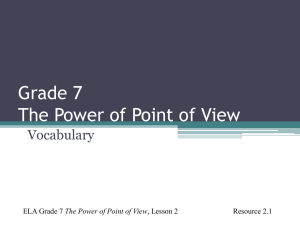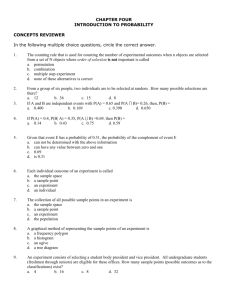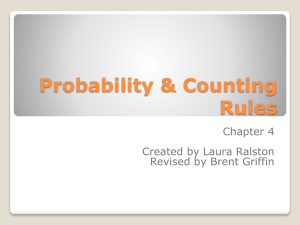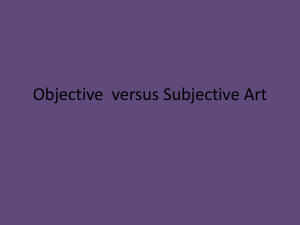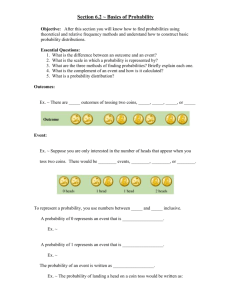All Probabilistic Methods Assume… 1 All Probabilistic Methods
advertisement
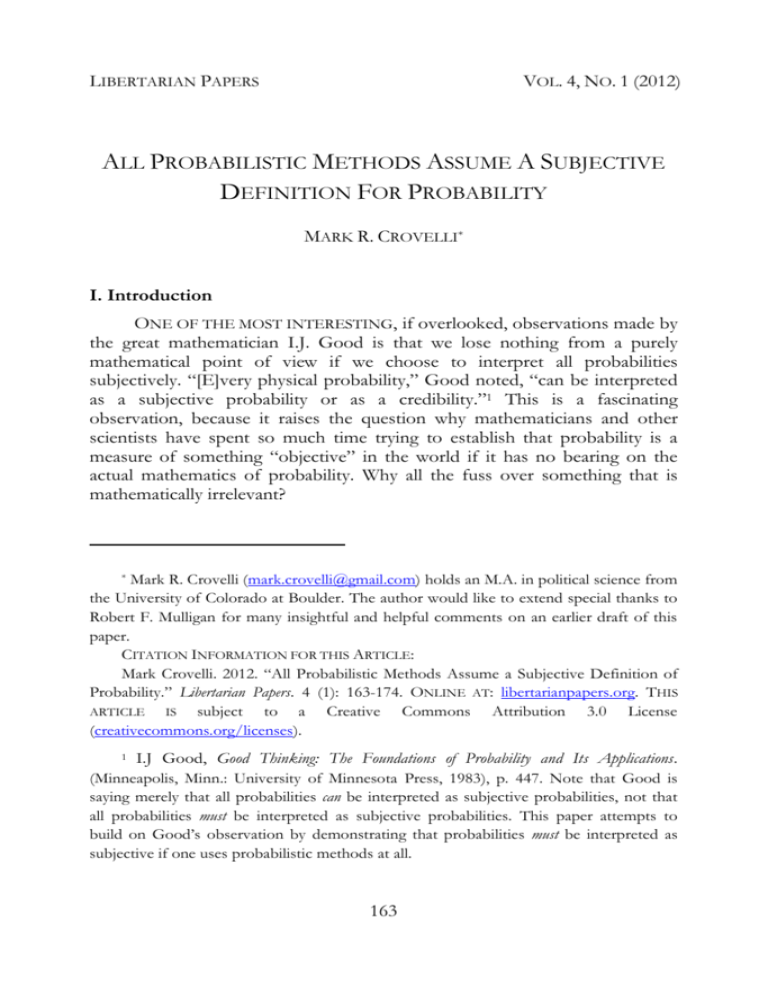
LIBERTARIAN PAPERS VOL. 4, NO. 1 (2012) ALL PROBABILISTIC METHODS ASSUME A SUBJECTIVE DEFINITION FOR PROBABILITY MARK R. CROVELLI* I. Introduction ONE OF THE MOST INTERESTING, if overlooked, observations made by the great mathematician I.J. Good is that we lose nothing from a purely mathematical point of view if we choose to interpret all probabilities subjectively. “[E]very physical probability,” Good noted, “can be interpreted as a subjective probability or as a credibility.”1 This is a fascinating observation, because it raises the question why mathematicians and other scientists have spent so much time trying to establish that probability is a measure of something “objective” in the world if it has no bearing on the actual mathematics of probability. Why all the fuss over something that is mathematically irrelevant? Mark R. Crovelli (mark.crovelli@gmail.com) holds an M.A. in political science from the University of Colorado at Boulder. The author would like to extend special thanks to Robert F. Mulligan for many insightful and helpful comments on an earlier draft of this paper. CITATION INFORMATION FOR THIS ARTICLE: Mark Crovelli. 2012. “All Probabilistic Methods Assume a Subjective Definition of Probability.” Libertarian Papers. 4 (1): 163-174. ONLINE AT: libertarianpapers.org. THIS ARTICLE IS subject to a Creative Commons Attribution 3.0 License (creativecommons.org/licenses). * 1 I.J Good, Good Thinking: The Foundations of Probability and Its Applications. (Minneapolis, Minn.: University of Minnesota Press, 1983), p. 447. Note that Good is saying merely that all probabilities can be interpreted as subjective probabilities, not that all probabilities must be interpreted as subjective probabilities. This paper attempts to build on Good’s observation by demonstrating that probabilities must be interpreted as subjective if one uses probabilistic methods at all. 163 164 LIBERTARIAN PAPERS 4 (1), (2012) This question is all the more fascinating because the idea of defining probability as a measure of subjective belief is not new. Indeed, the subjective interpretation for probability was explicitly articulated by Augustus De Morgan almost seventy years before the birth of the famous modern subjectivist Bruno de Finetti. “Probability,” wrote De Morgan in 1838, “is the feeling of the mind, not the inherent property of a set of circumstances.”2 One would think that mathematicians since De Morgan’s day would have been content to accept this subjective definition of probability (or at least ignore the question altogether), since it had no bearing whatsoever on the mathematics of probability. After all, if it is mathematically irrelevant, why not call probabilities subjective as De Morgan suggested and leave the matter at that? While we might expect that mathematicians and scientists since De Morgan’s time would be content to define probability subjectively or ignore the matter altogether, the actual history of probability since De Morgan’s day is replete with mathematicians and scientists who sought to establish that probability is more than simply a measure of subjective belief. Their goal was to define probability as an “objective” measure of something real and “out there” in the world; a contention that they spent enormous amounts of time vigorously defending. It is curious, to say the least, that so many thinkers should spend so much time writing and worrying about an obscure epistemological question that, as Good notes, has no bearing whatsoever on the actual mathematics of probability. In this paper, I argue that it is even more curious that these scientists and mathematicians would search for an “objective” foundation for probability when their own methods rule that possibility out. I argue that all of the major methods for generating numerical probabilities (i.e., the relative frequency approach, the a priori approach and the classical approach) can only legitimately be used in a causally-deterministic world.3 This is important, I 2 Augustus De Morgan, An Essay on Probabilities and on their Application to Life Contingencies and Insurance Offices (London, 1838), pp. 7-8. Quoted in Theodore M. Potter, The Rise of Statistical Thinking 1820-1900 (Princeton, NJ: Princeton University Press, 1986), pp. 74-75. Almost 50 years after De Morgan’s pronouncement, and exactly 20 years before de Finetti’s birth, Johannes von Kries would similarly define probability subjectively. See, Ibid. p. 86. 3 I omit subjective methods here because subjective methods start from the assumption that probability is a subjective measure of belief. I discuss subjective methods in the conclusion below. I also omit any discussion of Kolmogorov’s axiomatic approach ALL PROBABILISTIC METHODS ASSUME… 165 argue, following the lead of I.J. Good, because we are forced to adopt a subjective definition for probability if the world is governed by time-invariant causal laws. I argue, in other words, that if probability can be legitimately and usefully used by mathematicians, this necessarily implies that 1) the world is governed by causal laws, and 2) probability must therefore be defined subjectively. This builds on my previous papers on this topic in an important way, because in those writings I merely sought to demonstrate that we are forced to define probability subjectively if we are causal determinists.4 In this paper, however, I go significantly beyond this by claiming that the use of probabilistic methods itself tacitly commits us to accept a subjective definition for probability. II. De Morgan Was Right: Probability Is Subjective If there was good reason to presume that probability is an “objective” measure of something “real” in the world, there would be nothing particularly interesting or surprising about the fact that scientists and mathematicians have gravitated toward defining probability in that way. Quite the reverse, our natural expectation would be that mathematicians and scientists would search for and advocate a definition of probability that best describes a real characteristic of the world. What makes their gravitation toward an objective definition of probability absolutely fascinating, however, is that probability is not an objective property of the real world. Probability is a measure of subjective to probability because Kolmogorov’s work is not related to the philosophical discussion of probability. Kolmogorov provided a purely mathematical method to assess any number, generated by any method, which satisfied his axioms. In other words, Kolmogorov’s approach tells us nothing about what probability is, or about which probabilistic methods are epistemologically justifiable, or even about what probability measures. Since these are the central questions this paper addresses, Kolmogorov’s axiomatic approach falls outside the scope of the discussion. For a classic exposition of Kolmogorov’s axioms, see Sheldon Ross, A First Course in Probability, (New York: Macmillan, 1976), pp. 20-23. 4 On this, see Mark R. Crovelli, “On the Possibility of Assigning Probabilities to Singular Cases, or: Probability is Subjective Too!”, Libertarian Papers 1, 26. (2009), and Mark R. Crovelli, “A Challenge to Ludwig von Mises’s Theory of Probability,” Libertarian Papers 2, 23 (2010). 166 LIBERTARIAN PAPERS 4 (1), (2012) belief, just as Augustus de Morgan claimed over a century and a half ago. The remainder of this section is devoted to providing a foundation for that claim. In order to see why de Morgan was right to define probability subjectively, it is important to first note that the definition of probability depends inexorably on the nature of the world.5 If every event and phenomenon which occurs in the world has an antecedent cause of some sort, then we are forced to say that probability is a measure of human ignorance or uncertainty about the causal factors at work in the world.6 This is true, because if every event or phenomenon has a cause of some sort, then there is by definition no such thing as “randomness” or “indeterminism” in the world. Man’s uncertainty in such a world could only stem from his inability to comprehend or account for all of the relevant causal factors at work in any given situation. If man was capable of comprehending all of the relevant causal factors at work in any given situation in a causally determinist world, his uncertainty would completely vanish, and it would be absurd for him to even talk about the “likelihood” or “probability” that something would or would not occur. He would know in advance, and for certain, whether something was or was not going to occur. In a causally deterministic world, in other words, we would be forced to define probability as a measure of man’s own subjective uncertainty, not a measure of something “real” or “objective” in the world. Given that we are forced to define probability as a measure of subjective belief if the world is governed by time-invariant causal laws, the critical question for mathematicians and scientists is whether the world is indeed governed by such laws. It is my contention here that the world is indeed ordered in a causally-deterministic fashion, and that the standard methods utilized by mathematicians and scientists for calculating probabilities must assume this to be true. In other words, the underlying assumption of all probabilistic methods (except subjective methods, ironically!) is that every event and phenomenon which occurs in the world has a causal reason for occurring. On this, see Mark R. Crovelli, “On the Possibility of Assigning Probabilities to Singular Cases, or: Probability is Subjective Too!” op cit. 6 See Good, op. cit., Crovelli, op. cit., and Mark R. Crovelli, “A Challenge to Ludwig von Mises’s Theory of Probability,” op cit. 5 ALL PROBABILISTIC METHODS ASSUME… 167 III. Relative Frequency Methods Can Only Be Utilized In a CausallyDeterministic World7 The relative frequency method for generating numerical probabilities, popularized primarily by Richard von Mises, involves grouping relevantly similar events into “classes” or “collectives” for which relative frequencies of occurrence can be calculated.8 In order to group events or phenomena into “classes” or “collectives,” however, one must assume that the world is ordered in a causally-deterministic fashion. As I have argued elsewhere: [I]n order to classify several discrete events together as a “collective,” one must assume that the underlying causal factors affecting each of the events are virtually identical in every way. Were one not to make the assumption that the same causal factors were operating on each of the events in virtually exactly the same way, one would not be in a position to say that the events were sufficiently similar to one another to be classified as members of the same “collective.” One would not be in a position to decide whether the events were members of the same “collective,” or whether they were so different from one another as to be logically incommensurable.9 Hence, the mathematician or scientist who makes use of the relative frequency method must assume that the world is ordered in a causallydeterministic fashion in order to utilize the method at all. Were the scientist not to make this assumption, it would be logically impossible for him to ever construct a non-arbitrary “class” or “collective” of events from which he could generate a relative frequency of occurrence a posteriori. Any “class” or “collective” of events that he might assemble would be completely arbitrary and purely subjective if the world were truly indeterministic and random, because every event would be logically incommensurable with and unrelated to every other event. The relative frequency method for generating numerical probabilities, in other words, can only be legitimately and usefully applied in a causally7 I follow Robert Crovelli here in separating the various methods for generating numerical probabilities from the definition of probability itself. See Robert A. Crovelli, “An Analysis of the Basic Concepts in Applied Mathematics,” Mises Institute Working Paper Series, (2011). 8 For an overview of the relative frequency method for generating probabilities, see in particular Richard von Mises, Probability, Statistics and Truth, (New York: Dover, 1981), and Roy Weatherford, op. cit. 9 Mark R. Crovelli, “On the Possibility of Assigning Probabilities to Singular Cases, or: Probability is Subjective Too!”, p. 14. 168 LIBERTARIAN PAPERS 4 (1), (2012) deterministic world. And since, as was seen above, probability must be defined subjectively if the world is causally-deterministic, this means that the relative frequency method is only capable of producing subjective probabilities. That is, the method is only capable of generating numerical measures of human uncertainty. Hence, any scientist or mathematician who would claim that the relative frequency method is capable of generating “objective” probabilities is mistaken. The relative frequency method itself can only be legitimately and usefully utilized if the scientist assumes that the world is causallydeterministic, and probability can only be subjective in a causally deterministic world. IV. The Classical Method Can Only Be Utilized In a CausallyDeterministic World The very same logic applies to what is known as the “classical” or “combinatorial” method for generating numerical probabilities. The “classical” method for generating probabilities involves assuming that each possible outcome of an event has an equal likelihood of occurring when we have no reason to believe otherwise.10 In the case of tossing a standard die, for example, the method would dictate assuming that each side of the die has a probability of 1/6.11 Laplace famously summarizes what has come to be known as the classical method in the following way: The theory of chance consists in reducing all the events of the same kind to a certain number of cases equally possible, that is to say, to such as we may be equally undecided about in regard to their existence, and in determining the number of cases favorable to the event whose probability is sought. The ratio of this number to that of all the cases possible is the measure of this probability, which is thus simply a fraction whose numerator is the number of favorable cases and whose denominator is the number of all the cases possible. Pierre-Simon Laplace, A Philosophical Essay on Probabilities, (New York: Dover, 1951 [1814]), pp. 6-7. For an excellent overview of the classical approach to probability, see, Roy Weatherford, Philosophical Foundations of Probability Theory. (Boston: Routledge and Kegan Paul, 1982). 11 It should be noted that the assumption of equal likelihood, (or, as it is sometimes called, the “principle of indifference”), is an assumption alone, and should not be confused 10 ALL PROBABILISTIC METHODS ASSUME… 169 As in the case of the relative frequency method, the mathematician or scientist who utilizes the classical method must assume that the world is ordered in a causally-deterministic fashion. Were he not to make this assumption, there would be no justification for limiting the possible outcomes in any given situation. In the example just cited, there would be no reason to limit the possible outcomes of tossing a die to 6. On the contrary, one would have to assume that there are an infinite number of equi-possible outcomes if the world is not ordered in a causally-deterministic fashion, which would mean that the probability of any event would always be 1/∞.12 Any toss of a die, for example, could potentially result in the die exploding in mid air, zooming off into space, landing on an edge or corner, the numbers on the die could disappear or change location, et cetera ad infinitum. In other words, by limiting the number of possible outcomes to 6, the mathematician or scientist is as saying that each outcome is in fact equally likely. In other words, the classicists were simply saying that, when we have no reason to think otherwise, we should simply assume that each outcome is equally likely. It is for this reason that Theodore Potter describes Laplace, not as a classicist, but rather as a subjectivist! See, Potter, op. cit., p. 119. 12 Some scientists have been keen enough to recognize that the indeterministic worldview implies an infinite number of possible outcomes in any given situation, even if it has led them to make odd claims as a result. Take, for example, this statement made by Ronald Inglehart: Other laws of physics are also slight oversimplifications of reality. For example, though the laws of gases say otherwise, it is conceivable that all of the air molecules in the reader’s vicinity could suddenly rush to the far end of the room and remain there until you died a horrible death. The reader need not worry. This is technically possible, but the probability is so overwhelmingly low that it would not be expected to occur even once during the entire lifetime of the universe (or even in many lifetimes of the universe). At the microlevel, the universe is probabilistic; this is a very significant fact. But it is extremely misleading to jump from this fact to the conclusion that Newton and Avogadro had it all wrong, and that the universe is disorderly and your brain could spontaneously explode at any moment. Technically, it could. But it is not likely to happen until long after the sun and the stars have all disappeared from the sky. Modernization and Postmodernization (New Jersey: Princeton University Press, 1997), p. 13. Emphasis added. Note the concession here that there is a probability for literally any scenario no matter how absurd it might be—even my own head exploding for no reason! 170 LIBERTARIAN PAPERS 4 (1), (2012) tacitly assuming that the world is governed by time-invariant causal laws that will severely limit what can happen when a die is tossed.13 Hence, any scientist or mathematician who would claim that the classical method is capable of generating “objective” probabilities is mistaken. The classical method itself can only be legitimately and usefully utilized if the scientist assumes that the world is causally-deterministic and will thus severely limit what can possibly occur, and probability can only be subjective in a causally deterministic world. V. A Priori Methods Can Only Be Utilized In a Causally-Deterministic World The so-called “a priori methods” for generating numerical probabilities also assume that the world is ordered in a causally-deterministic fashion, if the probabilities so generated are assumed to have any relationship to the “real world.”14,15 The various a priori methods for generating numerical probabilities involve assessing the “truth value” of propositions, typically using deductive logic. Like the classical method, the a priori methods are founded on the idea of analyzing the range of possible outcomes for an event as well as the “evidence” that a proposition is true or an event will or will not occur. As in the case of the previous two methods, the mathematician or scientist that utilizes the a priori method must assume that the world is ordered in a causally-deterministic fashion. Were he not to make this The scientist could, of course, interpret these methods as purely subjective judgments limiting what can possibly happen when the die is tossed. In that case, the probabilities that he would generate would be completely subjective, in that they would only represent a numerical measure of the scientist’s own subjective beliefs about what could possibly occur. The case of subjective probabilistic methods of this sort is treated in the conclusion. 14 For an overview of the a priori approach to probability, see John Maynard Keynes, A Treatise on Probability, (New York: Macmillan, 1921), especially Part I, and Weatherford, op. cit. 15 Because the a priori methods involve the assessment of propositions rather than numerical or other empirically verifiable data, there is no reason why this method need only apply to propositions about the observable world. One could just as easily assess the “truth value” of propositions about Allah, for example, as propositions about nuclear particles. 13 ALL PROBABILISTIC METHODS ASSUME… 171 assumption, he would have no justification for ever restricting the scope of possible outcomes to less than ∞. Nor, importantly, would he have any justification for examining empirical “evidence” at all. As in the case of the classical method, if the world is indeed indeterministic or random, it would be a completely arbitrary decision to restrict the number of possible outcomes of any future event to a number less than ∞. If anything can occur without a reason or cause of some sort, which is precisely what indeterminism means, then it is completely arbitrary to eliminate any of those possible outcomes from your probability calculus. This is just as true of the a priori methods as it is for the classical method. Nor does examining “evidence” extricate the scientist from this dilemma. In fact, if the word is truly indeterministic and random, and events and phenomena can occur without any reason or cause, then there is no justification for examining “evidence” at all! Empirical evidence can only legitimately be utilized to predict something, quite obviously, if that evidence is causally connected to the event’s outcome. If it has no causal connection with the event’s outcome, then it is completely irrelevant and meaningless information. Thus, if one is examining evidence in the hope of divining the likelihood that something will or will not occur, one must assume that the world is causally deterministic, in the sense that the possible outcomes are severely restricted. This means, of course, that the scientist or mathematician who uses “evidence” as a part of his probabilistic methods must adopt a subjective definition for probability, because probability can only be defined subjectively in a causally-deterministic world. Hence, any scientist or mathematician who would claim that a priori methods are capable of generating “objective” probabilities is also mistaken. The a priori methods themselves can only be legitimately and usefully utilized if the scientist assumes that the world is causally-deterministic. VI. Conclusion It is a great irony that the only probabilistic methods that do not assume that the world is causally deterministic are the so-called “subjective” methods. The various subjective methods start from the assumption that probability is a subjective measure of human uncertainty, not something “out there” in the world, and use indirect evidence to predict an event’s outcome. No assumptions about the nature of the world are required to utilize subjective methods or define probability subjectively, which is precisely the point I.J. Good was making in the quotation above. 172 LIBERTARIAN PAPERS 4 (1), (2012) Since subjective methods do not assume causal determinism, they are the only probabilistic methods that are compatible with an indeterministic worldview. As we have seen, all of the other prominent methods for generating numerical probabilities tacitly assume that the world is governed by time-invariant causal laws. To use the relative frequency method, the classical method, or the a priori methods is to tacitly admit that the world is governed by time-invariant causal laws. This means that indeterminists like Richard von Mises, the famous proponent of the relative frequency method, are inconsistent in the extreme. To advance an indeterministic worldview while defending a probabilistic method that itself assumes causal determinism is contradictory. To be consistent, indeterminists like Richard von Mises ought to defend a subjective definition for probability and subjective methods for generating numerical probabilities, since only subjective methods are compatible with an indeterministic worldview. Moreover, as an indeterminist, Richard von Mises ought to have rejected his own relative frequency method as being founded on the assumption that the world is causally-deterministic. This admonishment makes intuitive sense as well. At root, the indeterministic worldview holds that events can occur in the world “randomly” and without cause. If we lived in such a world (or indeed, if such a world can even be conceived of) it would be truly miraculous if there existed an “objective” method for predicting uncaused events. It is much more intuitively plausible to conceive of probabilistic methods as measuring our subjective uncertainty about future events, rather than thinking that they are methods for predicting what is by definition uncaused and unpredictable. It is important to note that the subjective definition for probability does not commit us to an indeterministic worldview, however. We do not, for example, have to become radical indeterminists like Richard von Mises if we choose to adopt a subjective definition for probability. The subjective definition for probability is just as compatible with a causally deterministic worldview (or any other form of determinism, for that matter) as it is with an indeterministic worldview, because the subjective definition does not purport to tell us anything about the nature of the world. In other words, while a deterministic worldview does force us to adopt a subjective definition for probability, as I.J. Good claimed, the reverse does not hold. The subjective definition for probability does not oblige us to say anything at all about the nature of the world. As has been seen above, however, all of the typical methods for generating numerical probabilities (again, besides the subjective methods) do ALL PROBABILISTIC METHODS ASSUME… 173 force their practitioners to adopt both a causally-deterministic worldview and a subjective definition for probability, because the methods can only legitimately and usefully be used in a causally-deterministic world. To employ any probabilistic methods besides subjective ones and claim either that the world is indeterministic or that probability is “objective” is contradictory. References Crovelli, Mark R. (2009). “On the Possibility of Assigning Probabilities to Singular Cases, or: Probability is Subjective Too!” Libertarian Papers 1, 26. ———. (2010). “A Challenge to Ludwig von Mises’s Theory of Probability,” Libertarian Papers 2, 23. Crovelli, Robert A. (2011). “An Analysis of the Basic Concepts in Applied Mathematics,” Mises Institute Working Paper Series. Online at: mises.org/journals/scholar/crovelli4.pdf. De Morgan, Augustus. An Essay on Probabilities and on their Application to Life Contingencies and Insurance Offices. London, 1838. Good, I.J. Good Thinking: The Foundations of Probability and Its Applications. Minneapolis, Minn.: University of Minnesota Press, 1983. Inglehart, Ronald. Modernization and Postmodernization: Cultural, Economic, and Political Change in 43 Societies. Princeton, N.J.: Princeton University Press, 1997. Potter, Theodore M. The Rise of Statistical Thinking 1820-1900. Princeton, NJ: 174 LIBERTARIAN PAPERS 4 (1), (2012) Princeton University Press, 1986. Keynes, John Maynard. A Treatise on Probability. New York, Macmillan, 1921. Laplace, Pierre-Simon. A Philosophical Essay on Probabilities. New York: Dover, 1951 [1814]. Mises, Richard von. Probability, Statistics and Truth. 2nd Revised ed. New York: Dover, 1981 [1957]. Ross, Sheldon. A First Course in Probability. New York: Macmillan, 1976. Weatherford, Roy. Philosophical Foundations of Probability Theory. Boston: Routledge and Kegan Paul, 1982.


